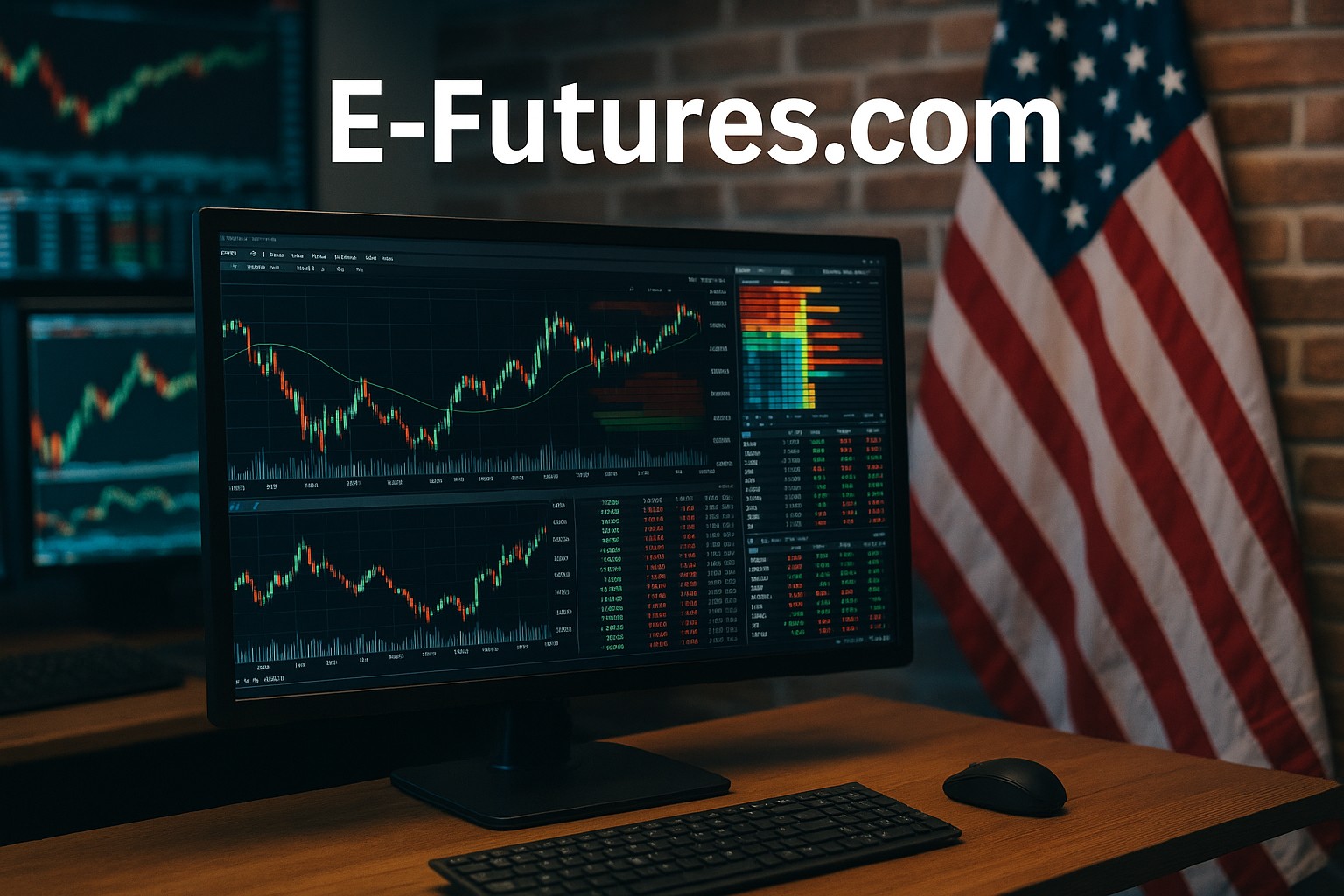
Futures contract trading has evolved significantly since its inception. From rudimentary agricultural agreements to sophisticated, real-time algorithmic executions powered by artificial intelligence (AI), the industry’s growth has been both dynamic and transformative. Traders today operate in a vastly different landscape than their predecessors, leveraging cutting-edge tools and platforms to optimize performance and profitability.
This article explores the historical trajectory of futures contract trading, the shift toward online, AI, and algorithmic platforms, and what advancements we can expect in the second half of the 2020s. Finally, we highlight why E-Futures, with its top-tier reputation, regulatory excellence, and technologically advanced CannonX powered by CQG platform, stands out as one of the best futures brokers in the industry.
The Origins of Futures Contract Trading
The roots of futures contract trading trace back centuries, with some of the earliest recorded instances occurring in 17th-century Japan. The Dojima Rice Exchange in Osaka allowed samurai and rice merchants to hedge against fluctuating rice prices. These transactions bore striking similarities to modern-day futures trading, including delivery dates, agreed-upon pricing, and contractual obligations.
By the 19th century, the Chicago Board of Trade (CBOT) was founded in 1848, becoming a formal marketplace for trading grain futures contracts. Traders began using standardized contracts to buy and sell agricultural products for future delivery. This practice allowed both producers and buyers to hedge against market volatility and secure prices in advance.
It wasn’t long before trading futures expanded into livestock, metals, and eventually financial instruments. The adoption of futures contract trading in U.S. and global markets reflected an evolving understanding of how these instruments could manage risk and speculate on price movements.
Futures Contract Trading in the 20th Century
The 20th century witnessed the institutionalization and expansion of futures trading. With the establishment of exchanges like the Chicago Mercantile Exchange (CME) and the development of new asset classes (such as currency and interest rate futures), futures brokers became essential facilitators of market access.
During this period, the role of brokers futures evolved. Rather than just executing orders, futures brokers became trusted advisors and intermediaries, offering valuable market insights. Trading was still largely done in open outcry pits—loud, chaotic environments where brokers physically shouted bids and offers.
Despite the frenzied energy, the market maintained high levels of transparency and liquidity. However, the arrival of the digital age would soon change everything.
The Shift to Online Futures Trading
By the late 1990s and early 2000s, electronic trading began replacing open outcry systems. Trading platforms allowed clients to access real-time quotes, execute orders instantly, and manage portfolios more efficiently. This democratized futures contract trading, enabling individual traders to compete on a more level playing field with institutions.
One of the most significant developments was the rise of the CQG trading platform, which provided traders with powerful charting tools, advanced analytics, and direct market access. Platforms like CannonX powered by CQG represent the zenith of these technological advancements, providing traders with a comprehensive, intuitive interface for executing and managing trades.
Online futures brokers like E-Futures emerged as leaders in this space. Their user-friendly platforms, low fees, and stellar customer service attracted a growing number of retail and professional traders. With trading futures becoming more accessible, new participants entered the market, adding liquidity and complexity.
The Rise of Algorithmic and AI-Powered Trading
As internet connectivity and computing power surged in the 2010s, so did the prevalence of algorithmic and AI-driven futures contract trading. Traders could now automate strategies using complex algorithms that analyzed real-time data and executed trades at lightning speed.
AI-driven models, including machine learning and natural language processing, enabled traders to anticipate market movements based on historical patterns, news sentiment, and global macroeconomic indicators. These models continuously learn and adapt, giving traders an edge in a hyper-competitive environment.
The integration of algorithmic trading into platforms like CannonX powered by CQG allows users to deploy, monitor, and optimize trading bots with minimal manual intervention. As a result, the human role has evolved from manual execution to strategic oversight, performance analysis, and system optimization.
This shift has not only improved efficiency but also increased the appeal of futures trading among data scientists, quantitative analysts, and tech-savvy retail traders.
Regulatory Frameworks and Transparency
The explosion of electronic and algorithmic trading futures has prompted greater scrutiny from regulators. Agencies like the Commodity Futures Trading Commission (CFTC) and the National Futures Association (NFA) enforce strict standards to maintain market integrity.
This has only enhanced the role of reputable futures brokers. Trust is now just as important as technology. E-Futures, with decades of unblemished experience and a stellar compliance record, has emerged as a broker that traders can rely on. Its reputation with federal and futures industry regulators is a testament to its commitment to transparency, customer protection, and ethical business practices. Unlike less-regulated offshore brokers, E-Futures adheres to all domestic requirements, offering peace of mind to its clients.
What’s Next? The Future of Futures Contract Trading in the Late 2020s
The second half of the 2020s is poised to bring dramatic changes to futures contract trading. Here’s what to expect:
- Greater AI Integration
AI will become even more entrenched in futures trading, moving beyond prediction to autonomous strategy generation. These models will refine risk management protocols, optimize trade entries and exits, and minimize slippage. - Blockchain and Smart Contracts
Blockchain technology could revolutionize how futures contracts are created, executed, and cleared. Smart contracts may automate compliance checks, settlements, and dispute resolution, increasing efficiency and trust. - Quantum Computing
Although still in its infancy, quantum computing has the potential to process complex financial models in seconds. When applied to trading futures, this could unlock new levels of speed and accuracy. - Personalized Trading Platforms
Expect further customization in platforms like CannonX powered by CQG, with dashboards that adapt to a trader’s style, risk tolerance, and asset preferences. Voice-activated commands and AR/VR visualization tools are on the horizon. - ESG and Sustainable Futures
A growing emphasis on environmental, social, and governance (ESG) factors is likely to impact commodity futures trading. Markets will increasingly reflect sustainability metrics, especially in agricultural and energy contracts.
Why E-Futures Is the Brokerage of Choice
With all this innovation, selecting the right brokerage is more important than ever. E-Futures stands out in numerous ways, making it a top contender for traders seeking reliability, technology, and expertise.
- Trust and Regulatory Standing
E-Futures boasts numerous 5 out of 5-star ratings on TrustPilot, reflecting its client-first philosophy. It maintains a pristine reputation with the CFTC, NFA, and other federal regulators. For traders who value integrity, this is a non-negotiable. - Decades of Industry Experience
Few futures brokers can match the longevity and industry insight of E-Futures. This depth of experience allows them to guide clients through volatile markets, new regulations, and evolving trading technologies. - World-Class Technology: CannonX Powered by CQG
The CannonX powered by CQG platform combines the best of modern trading tools—precision execution, customizable interfaces, robust analytics, and low-latency data. It is designed to meet the needs of retail traders, professionals, and institutions alike.As one of the best futures trading platforms, CannonX powered by CQG ensures that every user has access to cutting-edge features like:
- Advanced charting with hundreds of indicators
- One-click order execution
- Real-time market depth and trade flow analysis
- Algorithmic strategy testing and deployment
- Seamless integration with APIs and third-party tools
- Superior Support and Education
E-Futures offers free platform demos, in-depth training materials, and access to experienced futures professionals. Whether you’re new to futures contract trading or managing complex strategies, their support is second to none. - Low Costs and Transparent Pricing
With competitive commission structures, no hidden fees, and access to multiple exchanges, E-Futures ensures clients maximize value without sacrificing performance. For cost-conscious traders, this is a major advantage.
Futures contract trading has come a long way—from the rice markets of 17th-century Japan to today’s AI-enhanced algorithmic platforms. As we look ahead to the second half of the 2020s, will continue to reshape the landscape.
In such a fast-moving environment, having the right partner is crucial. With its impeccable reputation, advanced technology, and unmatched client service, E-Futures remains a top-tier brokerage for anyone serious about futures trading.
From beginners exploring trading futures for the first time to institutions executing multi-million-dollar strategies, E-Futures, supported by the CannonX powered by CQG platform, delivers everything a trader needs to succeed.
Ready to start trading futures? Call us at 1(800)454-9572 (US) or (310)859-9572 (International), or email info@cannontrading.com to speak with one of our experienced, Series-3 licensed futures brokers and begin your futures trading journey with E-Futures.com today.
Disclaimer: Trading Futures, Options on Futures, and retail off-exchange foreign currency transactions involve substantial risk of loss and are not suitable for all investors. Past performance is not indicative of future results. Carefully consider if trading is suitable for you in light of your circumstances, knowledge, and financial resources. You may lose all or more of your initial investment. Opinions, market data, and recommendations are subject to change at any time.
Important: Trading commodity futures and options involves a substantial risk of loss. The recommendations contained in this article are opinions only and do not guarantee any profits. This article is for educational purposes. Past performances are not necessarily indicative of future results.
This article has been generated with the help of AI Technology and modified for accuracy and compliance.Follow us on all socials: @cannontrading





